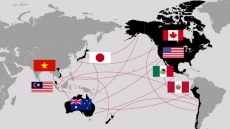VANCOUVER — A former British soldier married to a disabled Canadian woman may be forced to leave their Victoria home for the United Kingdom after a series of missteps and a snarl of red tape.
John Collins, 62, first made an application for refugee status when he entered Canada, based on alleged harassment in the U.K. by a member of the Irish Republican Army. The application was denied and he's been ordered to leave by the Immigration and Refugee Board.
But Collins is the main caregiver for his wife, Anne, who is disabled and can't work. He also doesn't make enough money as a security guard to pay their bills while saving for airfare so both can return voluntarily to the U.K., said John.
"We are totally stuck," said John. "We are penned into the corner at the moment, and the situation is getting worse day by day."
"We just really need help but we want to also point out how unjust the whole thing has been," added Anne, who's 63.
Green party Leader Elizabeth May, who is running for re-election in the nearby riding of Saanich-Gulf Islands, said her staff is helping the couple, noting their situation isn't unique, but is complicated.
The Collins married a decade ago and came to Canada from England in September 2012. When they arrived, John was denied entry and told that if he wanted to work in Canada he would have to return to the U.K. to apply. After hours of questioning, and in frustration, Anne suggested he make a refugee claim.
A July Immigration and Refugee Board decision noted John served in the British special forces and he claimed a member of the IRA recognized him as a veteran at church. After that, his house was flooded, hit by fire, vandalized and robbed, the board heard.
The decision said he hadn't proven the events were ordered by the IRA, nor did Collins provide any "objective evidence" the IRA was pursuing British veterans. It ruled police acted on his complaint and he was unable to prove they couldn't protect him.
The board ruled John was not a refugee nor in need of protection. He's been told to leave by Nov. 6.
Refugee board spokeswoman Melissa Anderson said it's rare for claims to be accepted from the U.K. because it's not considered a refugee-producing nation by the Canadian government.
Citizenship and Immigration Canada, the Immigration and Refugee Board and Canada Border Services Agency declined to comment on the case, citing privacy concerns.
Government rules say a person cannot apply to remain in Canada on humanitarian and compassionate grounds if their application has been rejected in the last 12 months.
The border agency said in an email that once a refugee claim has been rejected, the person is required to leave Canada within 30 days after a departure order becomes enforceable.
John said he is prepared to return, but Anne is wheelchair-bound, and also suffering with a broken hip, and he doesn't want to leave her alone.
"I've been married to her for 10 years," he said. "I've looked after her and suddenly I'm being told by a little clerk in an office that she can get somebody else to look after her."
He also said he earns just a little more than $12 an hour as security guard in the Victoria area and can't save the money needed to pay their bills and save for their flights.
Anne could return to the U.K. with John because of her British ancestry, but she said John also helps her brother who is in an assisted-living facility.
May said her staff spends about 90 per cent of their time working on immigration and refugee cases.
She called any such action against John "outrageous," noting Anne is disabled and needs her husband.
"This is the kind of circumstance where a removal order makes no sense," she said.





